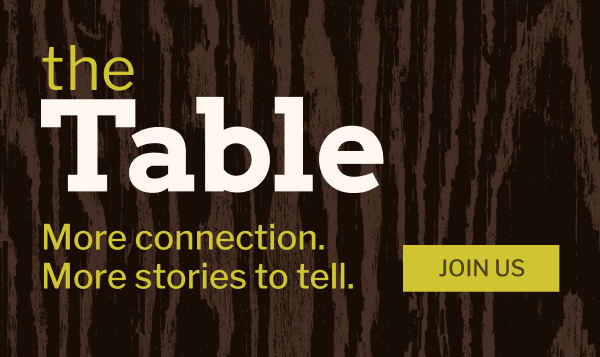
Ignore the Megaphone: How Quiet Lives Save the World
"No one will remember you," they mocked.
Food as a verb thanks
for sponsoring this series

Got a bone to pick with media. Several bones, actually. Let's start here:
Media is incomplete and myopic, as if it looks at the world with cataract eyes.
Yes, there are bombs, Bezos, tariffs, tornados, Russian drones, rising seas and raging politics but ...
That's not all there is.
Media - at best, performs as a civic alarm bell; at worst, a spiraling-agitation-for-profit-machine - emphasizes the most unnerving qualities of life.
Another bone, another problem:
It is so damn loud. George Saunders compares it to a man at a party with a megaphone. Folks may want quiet conversations, but as long as this man is shouting in the megaphone,
"In time, Megaphone Guy will ruin the party," Saunders writes.
You see where Saunders is going. Imagine 1000 Megaphone Men at the same party. It's simply too much. The quiet party collapses, devolving into one big stress ball.
The Megaphones become a cultural diffuser, spraying a mist - imbalanced, agitating, uneasy, smelling like fear - over all the aspects of our experience.
By design, media must exist as a MEGAPHONE, and, by design, megaphones must be loud, disquieting and alarming.
And over time, we lose touch with the touch and importance of simple things.
And quiet days.
And hidden lives.

The other night, we were at JMac's Vino and Vinyl; I'd just finished up my talk on media, agriculture and the origins of Food as a Verb with our The Table community.
It was a good, Goldilocks crowd: not too big, not too small, just right.

On the far couch sat Damon Bartos, the urban farmer, responsible for growing 4,000 pounds of food - organic - and sharing with 100s of Alton Park families.
Is he newsworthy? How would the Media Megaphone view one urban farmer and the kids that love him?

Nearby sat another friend. She works in the medical industry, responsible for picking up early indicators of all sorts of illness - some benign, others not - greeting patients at their most vulnerable with such kindness, steady hands and rock-solid professionalism. Next to her, a vet, who's saved countless lives, healed countless pets, comforted countless families.
Do they get media attention?
Sipping wine, another friend: honest as the day is long. And another: working to launch a new Saturday farmers' market.
And another: a doctor who was at the forefront of our county's pandemic response. Another: a leader of a men's group.
Let's widen the lens. Forget what our phones tell us.
How many people do you know leading lives of integrity?
Who make daily decisions that impact others for good? For generosity?
Whose small gestures - one word, one action - have shifted the trajectory of our lives?
We keep gnashing our teeth - the world is going to hell, we say - yet, on the ledger book, is there not an endless balance sheet renewed daily that tilts towards connection and relational goodwill?
In the small stories of our daily lives, take record of all the sweet and small moments where our hearts feel full. Uplifted, even just a smidge.
Think of all the others like that, too.
The farmers.

The early morning bakers.


The restaurant owners.


The families.

These are quiet lives, spent beyond the glare of any media megaphone.

Our hearts get recalibrated a bit when we remember how precious are the small actions - even and especially - the tiniest ones.
They are the very things that keep the world spinning.
The hands devoted to caring, loving and restoring.




Near the end of our night at JMac's, one man spoke up. Name's Virgil, he said. Began speaking about that Terrance Malick film about the Austrian man who resisted the Nazis, refusing to fight.
He was executed for his objection.
Virgil told us they mocked him. Neighbors, the church, the Nazis. Think your life will make any difference? Think your resistance will ever matter?
No one will remember you.
Your life will make no difference.
Then, Virgil pulled out his phone and read a quote from Middlemarch, the 19th century novel by Mary Ann Evans. (She wrote as George Eliot.)
He quoted its final line:
But the effect of her being on those around her was incalculably diffusive:
for the growing good of the world is partly dependent on unhistoric acts;
and that things are not so ill with you and me as they might have been, is half owing to the number who lived faithfully a hidden life, and rest in unvisited tombs."
In that moment, our Goldilock's crowd at JMac's got really still. Virgil's Middlemarch moment had reminded us of something we often forget.
The growing good of the world ... depends on quiet acts and hidden lives.
Things aren't falling apart between us as much as we think.
Why?
Because of the holy glue of countless numbers of good and kind people, whose lives are all lived out under quiet skies.
No Megaphones.

The world is not lost.

As long as we remember.

Story ideas, questions, feedback? Interested in partnering with us? Email: david@foodasaverb.com
This story is 100% human generated; no AI chatbot was used in the creation of this content.
Got a bone to pick with media. Several bones, actually. Let's start here:
Media is incomplete and myopic, as if it looks at the world with cataract eyes.
Yes, there are bombs, Bezos, tariffs, tornados, Russian drones, rising seas and raging politics but ...
That's not all there is.
Media - at best, performs as a civic alarm bell; at worst, a spiraling-agitation-for-profit-machine - emphasizes the most unnerving qualities of life.
Another bone, another problem:
It is so damn loud. George Saunders compares it to a man at a party with a megaphone. Folks may want quiet conversations, but as long as this man is shouting in the megaphone,
"In time, Megaphone Guy will ruin the party," Saunders writes.
You see where Saunders is going. Imagine 1000 Megaphone Men at the same party. It's simply too much. The quiet party collapses, devolving into one big stress ball.
The Megaphones become a cultural diffuser, spraying a mist - imbalanced, agitating, uneasy, smelling like fear - over all the aspects of our experience.
By design, media must exist as a MEGAPHONE, and, by design, megaphones must be loud, disquieting and alarming.
And over time, we lose touch with the touch and importance of simple things.
And quiet days.
And hidden lives.

The other night, we were at JMac's Vino and Vinyl; I'd just finished up my talk on media, agriculture and the origins of Food as a Verb with our The Table community.
It was a good, Goldilocks crowd: not too big, not too small, just right.

On the far couch sat Damon Bartos, the urban farmer, responsible for growing 4,000 pounds of food - organic - and sharing with 100s of Alton Park families.
Is he newsworthy? How would the Media Megaphone view one urban farmer and the kids that love him?

Nearby sat another friend. She works in the medical industry, responsible for picking up early indicators of all sorts of illness - some benign, others not - greeting patients at their most vulnerable with such kindness, steady hands and rock-solid professionalism. Next to her, a vet, who's saved countless lives, healed countless pets, comforted countless families.
Do they get media attention?
Sipping wine, another friend: honest as the day is long. And another: working to launch a new Saturday farmers' market.
And another: a doctor who was at the forefront of our county's pandemic response. Another: a leader of a men's group.
Let's widen the lens. Forget what our phones tell us.
How many people do you know leading lives of integrity?
Who make daily decisions that impact others for good? For generosity?
Whose small gestures - one word, one action - have shifted the trajectory of our lives?
We keep gnashing our teeth - the world is going to hell, we say - yet, on the ledger book, is there not an endless balance sheet renewed daily that tilts towards connection and relational goodwill?
In the small stories of our daily lives, take record of all the sweet and small moments where our hearts feel full. Uplifted, even just a smidge.
Think of all the others like that, too.
The farmers.

The early morning bakers.


The restaurant owners.


The families.

These are quiet lives, spent beyond the glare of any media megaphone.

Our hearts get recalibrated a bit when we remember how precious are the small actions - even and especially - the tiniest ones.
They are the very things that keep the world spinning.
The hands devoted to caring, loving and restoring.




Near the end of our night at JMac's, one man spoke up. Name's Virgil, he said. Began speaking about that Terrance Malick film about the Austrian man who resisted the Nazis, refusing to fight.
He was executed for his objection.
Virgil told us they mocked him. Neighbors, the church, the Nazis. Think your life will make any difference? Think your resistance will ever matter?
No one will remember you.
Your life will make no difference.
Then, Virgil pulled out his phone and read a quote from Middlemarch, the 19th century novel by Mary Ann Evans. (She wrote as George Eliot.)
He quoted its final line:
But the effect of her being on those around her was incalculably diffusive:
for the growing good of the world is partly dependent on unhistoric acts;
and that things are not so ill with you and me as they might have been, is half owing to the number who lived faithfully a hidden life, and rest in unvisited tombs."
In that moment, our Goldilock's crowd at JMac's got really still. Virgil's Middlemarch moment had reminded us of something we often forget.
The growing good of the world ... depends on quiet acts and hidden lives.
Things aren't falling apart between us as much as we think.
Why?
Because of the holy glue of countless numbers of good and kind people, whose lives are all lived out under quiet skies.
No Megaphones.

The world is not lost.

As long as we remember.

Story ideas, questions, feedback? Interested in partnering with us? Email: david@foodasaverb.com
This story is 100% human generated; no AI chatbot was used in the creation of this content.


















